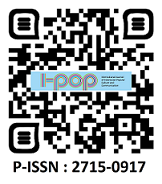Self-Styling, Popular Culture, and the Construction of Global-Local Identity among Japanese Food Lovers in Purwokerto
DOI:
https://doi.org/10.36782/i-pop.v1i1.33Keywords:
appropriation, homogenizing of culture, heterogenizing of culture, identity, food cultureAbstract
People are currently faced with the kaleidoscopic flux of dishes, that almost everyone encounters various foods from around the world, one of which is Japanese Food. The presence of Japanese food in Purwokerto City, Central Java is the consequence of the global power with its capability to produce thoughts and ideas, real or illusory, related to their products and all of which influence local values and cultures. This research studies the impacts of globalization as reflected in the formation of identity and lifestyle in connection with Japanese food consumption. The research’s objective is to study some powers the decision to consume Japanese food is based on from the perspective of popular culture’s influence. The research result shows that according to the participants, media and popular culture products contribute to the formation of layered identities. The globalization of Japanese food consumption culture does not produce cultural homogenization process, as one of many powers in the participants’ life, and media has encouraged heterogenization. Through the concept and practice of appropriation processes, Japanese food consumption has become part to communicate their cultural identity. The presence of Japanese food is one factor of the emergence of a new lifestyle, namely “Japanese lifestyling”, which is one lifestyle practiced by some people of Purwokerto which serves to enrich its consumers’ identity to be individuals who attempt to embrace the world through eating experience.
Downloads
References
Anthony, G. (1990). The Consequences of Modernity. Cambridge: Polity Press, p. 21.
Appadurai, A. (1996). Modernity at Large: Cultural Dimension of Globalization. Minneapolis, MN: University of Minnesota Press.
Appadurai, A. (1990). “Disjuncture and Difference in the Global Cultural Economy”. In: Featherstone, Mike (ed). Global Culture: Nationalism, Globalisation and Modernity. London: Sage: 295-310.
Appadurai, A. (2003). Modernity at Large: Cultural Dimensions of Globalization. Minneapolis: University of Minnesota Press.
Ashley. B., Joanne. H., Jones. S., Taylor. B., (2004). Food and Cultural Studies. London: Routledge
Barker, C, and Dariusz G. (2001). Cultural Studies and Discourse Analysis: A Dialogue on Language and Identity, London: Sage Publications Ltd, 2001.
Barker, C. (1999). Television, Globalization and Cultural Identities. Philadelphia: Open University Press
Barker, C. (2009). Cultural Studies: Teori & Praktik [Theory and Practice], Kreasi Wacana, Bantul.
Baudrillard, J, (1998). The Consumer Society (translated from La Société de consommation, preface given by George Ritzer), Sage Publication: London.
Budiharjo, E. (2015). Dari globalisasi ke glokalisasi [From Globalization to Glocalization], retrieved from http//www.unisosdem.org/article_detail.php?aid=3964&caid=24&gid=3, accessed on 15 April 2015
Canclini, N. G. (1995). Hybid Cultures: Strategies for Entering and Leaving Modernity, Minneapolis, University of Minnesota Press.
Carrier, J.G. (1995). Gifts and Commodities. Exchange & Western Capitalism since 1700, London, Routledge.
Chamberlain, K.2004. Food and health: Expanding the Agenda for Health Psychology. Journal of Health Psychology, 9(4), 467-481.
Doi:10.1177/13591053040440 PMID: 15231050.
Chaney, D. (1996). Lifestyle: Sebuah Pengantar Komprehensif [A Comprehensive Introduction]. (Translated by: Nuraeni), Yogyakarta, Jalasutra.
Featherstone, M., Lash, S., Robertson, R. (1995). Global Modernities, Sage Publication.
Fischler, C. (1988). Food, Self and Identity. Social Science Information 27:275-293.
Foster, G.M & Anderson, B.G. (1988). Antropologi Kesehatan [Health Anthropology]. Translated by Priyanti Suryadarma and Meutia F. Hatta Swasono, Jakarta, UI Press.
Gerke, S. (2002). “Global Lifestyles Under Local Conditions: the New Indonesian Middle Class”, in Chua, Beng-Huat, Consumption in Ais. London: Routledge.
Giddens, A. (1990). The Consequences of Modernity. Cambrige: Polity Press, pp. 21
Hall, S. (2000a). “The Local and the Global: Globalisation and Ethnicity”. In: King, Anthony (ed). Culture, Globalization and the World-System: Contemporary Conditions for the Representation of Identity. Minneapolis: University of Minnesota Press: 19-39
Hall, S. (2000b). “Old and New Identities, Old and New Ethnicities”. In: King, Anthony (ed). Culture, Globalization and the World-System: Contemporary Conditions for the Representation of Identity. Minneapolis: University of Minnesota Press: 41-68
Halo Jepang, Edition of April 2014
Hannerz, U. (1990). “Cosmopolitans and Locals in World Culture”. In: Featherstone, Mike (ed). Global Culture: Nationalism, Globalisation and Modernity. London: Sage: 237-251
Hannerz, U. (2000). “Scenarios for Peripheral Cultures”. In: King, Anthony (ed). Culture, Globalization and the World-System: Contemporary Conditions for the Representation of Identity. Minneapolis: University of Minnesota Press: 107-128
Ibrahim, Idi, S., & Akhmad, B,A. (2014). Komunikasi dan Komodifikasi. Mengkaji Media dan Budaya dalam dinamika Globalisasi [Communication and Commodification: Examining Media and Culture in Globalization Dynamics]. Buku Obor. Jakarta.
Jenkins, R. (2004). Social Identity (Second Edition). London: Routledge
Jetro 2013. Japanese Food Overseas
https://www.jetro.go.jp/ext_images/en/reports/survey/pdf/2013_11_other.pdf
Kardjati, S., Kusin, J.A, & C deWith. (1977). East Java Nutrition Studies. Report New Jersey, John Wiley & Sons, Inc.
Keller, D. (1995). Media Culture, Cultural Studies: Identity and Politics Between the Modern and the Postmodern. New York: Routledge.
Kraidy, M. (2005). Hybridity, or the Cultural Logic of Globalization, Philadelphia, Tempe University Press.
Kumakura, I. (2000). The Globalization of Japanese Food Culture.
https://www.kikkoman.co.jp/kiifc/foodculture/pdf_01/e_006_007.pdf.
Laemmerhirt, I.A. (2010). “Imagining the Taste: Transnational Food Exchanges Between Japan and the United States,” The Journal of American Studies, No. 21, pp. 232
Laksono,P.M, (2009). Peta Jalan Antropologi Indonesia Abad Kedua Puluh Satu: Memahami Invisibilitas (Budaya) di Era Globalisasi Kapital [The Indonesian Anthropology Path Map in the Twenty First Century: To Get an Understanding of (Cultural) Invisibility in the Capital Globalization Era]. Inauguration Speech of Professor Title of FIB UGM, retrieved from
https://repository.ugm.ac.id/136690/1/2015_2009_paschalis_maria_leksono_pk_red_opt.pdf, accessed on 20 March 2016
LeMay, Brian WJ (ed). (1988). Science, ethic, and food. Washington and London:
Lull, J. (2000). Media Communication and Culture: A Global Approach. New York: Columbia University Press.
Matsuura, K. (1994). Kamus Bahasa Jepang-Indonesia [Japanese-Indonesian Language Dictionary], Kyoto Sangyo University Press.
Niva. M. (2008), Consumer and the conceptual and practical appropriation of functional foods. National Consumer Research Center. Dissertation. Universitas Helsinki.
Nützenadel. A., &Trentmann. F. (2008). Food and Globalization: Consumption, Markets and Politics in the Modern World. University of California: Berg.
Pambudy, N. M. (2012). Gaya Hidup Suka mengonsumsi dan meniru. Beranikah Berinovasi. Prisma, pp, 14-77.
Parasecoli, Fabio, 2008. Bite Me: Food in Popular Culture. Berg Publisher.
Piliang dalam “Retakan-retakan Kebudayaan: Antara Keterbatasan dan Ketakberhinggaan [Cracks of Culture: Between Limitedness and Infinity],” Melintas Vol. 25 No. 01 (April 2009).
Pinilih, M., Shaferi, I, (2015). Perilaku Mahasiswa dalam Memilih Tempat Makan Berciri Internasional [Students’ Behaviors in Selecting Eating Places with International Characteristics]. Jurnal Probisnis Vol.8 no. 1 February 2015, p. 56-63.
Rantanen, T. (2005). Media and Globalization. London: Sage.
Ray, K. (2007). Domesticating Cuisine: Food and Aesthetic on American television, Gastronomica, 7 (1 Winter), 50-63.
Robertson, R. (2000). “Social Theory, Cultural Relativity and the Problem of Globality”. In King, Anthony (ed). Culture, Globalization and the World-System: Contemporary Conditions for the Representation of Identity. Minneapolis: University of Minnesota press: 69-90.
Robertson. R. (1992). Globalization: Social Theory and Global Culture. London: Sage, hal 56-89.
Robertson, R. (1995). Glocalization: Time-space and Homogeneity-Heterogeneity. SAGE Publication Ltd. London.
Sanjur, D. (1982), Sosial dan Nutrisi dalam Prespektif Budaya [Social and Nutrition in Cultural Perspective], Prentice Hall, Inc.
Saptandari, P. (2004). “Pendidikan Budi Pekerti dan Kesadaran Budaya” [Character Education and Cultural Awareness] in Buletin Jambatan Bulletin of Javanese Culture Memayu Hayuning Bawana, Javanology institution in Surabaya.
Schirato, T., & Webb, J. (2006). Understanding Globalization. London: Sage.
Sigismondi, P. (2005). “The Digital Glocalization of Entertainment: New Smithsonian Institute Press.
Sumartono, N. (1986). Gizi ditinjau dari sudut antropologi [nutrition viewed from the anthropological perspective]. Buletin Gizi no.1. vol.10.
Thussu, D. (2007). “Mapping Global Media Flow and Contra-Flow”. In: Thussu, Daya (ed). Media on the Move: Global Flow and Contra Flow. New York: Routledge: 11-32.
Tomaselli, K.G. (2005). “Paradigm, Position and Partnership: Difference in Communication Studies in: Communication, Vol. 31 (1), p. 33-48. South Africa: Unisa Press.
Tomlinson, J. (1999). Globalization and Culture. Cambrige: Polity Press.
Wallerstein, I. (1990). “Culture as the Ideological Battleground of the Modern World System”. In Featherstone, Mike (ed). Global Culture: Nationalism, Globalisation and Modernity. London: Sage: 31-55
Warren, J.B, (2002). “Food Matters: Perspective on an Emerging Field,” in Food Nations: Selling Taste in Consumer City, edition of Warren Belasco and Philip Scraton, London, Routledge.
Wicaksono, R, METI: Indonesia Pasar Penting bagi Industri Kreatif Jepang [Indonesia as an Important Market for Japanese Creative Industries].
Winarno, F.G., Wida., & Driando A. (2017). Tempe-Kumpulan Fakta Menarik Berdasarkan Penelitian [Tempeh: A Collection of Interesting Facts based on Research]. Gramedia Pustaka Utama, Jakarta.









